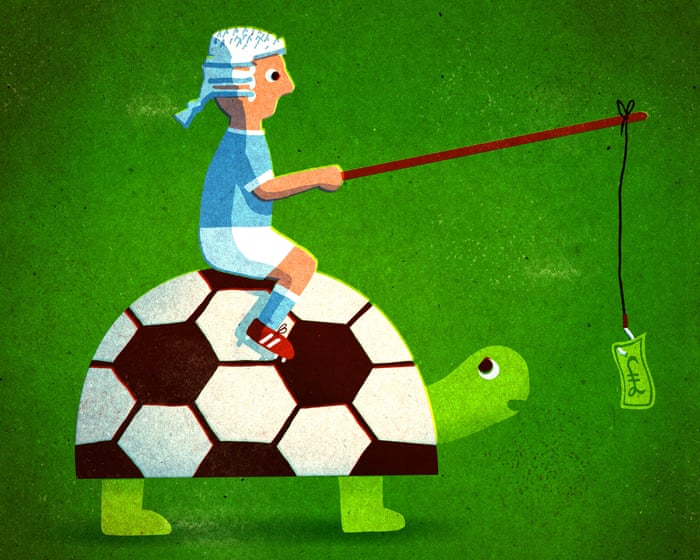Happy one-year anniversary! How has it been? How do you feel? More in love, or less? Have you been counting the days? Are you happier, wiser, more centered—like a man in a porridge commercial, going for a soulful morning jog on a sunlit cul-de-sac?
Or maybe, to look at it another way, you feel so sick at the thought of sifting through pre-packaged, biased reactions to a highly complex legal battle that your insides might just liquefy and shoot out your nose straight into the toaster. Who knows? Maybe that was the plan all along.
Either way, this week marks one year since the Manchester City charges tribunal began. Remember that? The 115 charges, later increased to over 130. Remember the feeling that something urgent and real was underway—though now it already seems like a period piece, the kind of thing you’d see on a nostalgia clip show, like Ocean Colour Scene or the Ebola virus.
A year is a long time in tribunal world, especially since if you follow football in any way, you’re ultimately paying for it. So maybe this anniversary deserves some kind of ceremony, like the Torajan people in Indonesia who dig up their dead every year, dress them in new clothes, have a chat, and take family photos. Perhaps we should be dusting off Lord Dyson or someone similar, sticking a cigarette in his mouth, and parading him around in a sedan chair.
But the Torajans don’t do this just out of love—it’s also about fear, reverence for the gods, and worry over future rice harvests. And that feels about right for the Premier League after a year of huge expense and mental exhaustion, all with the growing sense that City have already won this process in more ways than one.
This has become something of a joke on the fringes of football. Why is it taking so long? The charges relate to financial reporting, employee pay, and profitability and sustainability rules. How hard can it be to sort this out?
Actually, very hard—and that’s normal. As someone with professional insight into corporate law, there’s a ton of complex nonsense to wade through. One nearly dead case at my old law firm dragged on for eight years, much of it spent digging through files in a south-coast hangar and fiercely debating the best local seafood spots.
But of course, this is no joke. The sheer amount of time that’s passed is significant in itself. Time is money—a lot of time is a lot of money. It’s been estimated that the Premier League’s legal bills over the past five years could be as high as £200 million. Meanwhile, Nottingham Forest and Everton have had their own issues, and Chelsea are now dealing with historical rule-breaking under an oligarch owner widely seen as Kremlin-connected—something nobody could have predicted, but hey, it’s all fine.
It’s also important to say clearly that there’s no evidence Manchester City have used complex legal tactics to delay and wear down their opponents. No one has any reason to suggest that. There’s a word for that kind of strategy, which isn’t in play here as far as anyone knows: lawfare. It’s a practice familiar to rich and powerful groups facing inconvenient regulations.
We know from defamation law what a SLAPP suit is—strategic litigation against public participation. The UK parliament has described it as “a suite of litigious techniques designed to intimidate, suppress, and destroy” those in its path. Cases become endlessly complicated. Related claims pile up. Settlements are dangled, costs are weaponized. You just want the pain to stop, don’t you?
This process has been identified by parliament as a threat to democracy, sometimes called “the tyranny of the majority.” And again, there’s…There is no evidence that Manchester City have any interest in this matter, or that they are doing anything other than defending their right to operate as they see fit.
A leaked email suggested that Manchester City’s chairman, Khaldoon al-Mubarak, “would rather spend £30 million on the 50 best lawyers in the world to sue for the next 10 years” than comply with UEFA’s financial pressure. However, this is only indirect and disputed evidence, such as the old email from Simon Cliff, City’s top legal advisor. There was also an unrelated comment in October 2024 that the league’s plan to update its rules rather than scrap them was “an unwise course [which] would likely lead to further legal proceedings and costs.” Again, you have to wonder—don’t you want this to end?
City’s legal challenges to the associated party transaction rules have also had unintended consequences. Both sides claimed victory, even though City lost on most of their arguments—a common tactic: just raise many points and see what sticks.
It’s unclear what the ultimate goal was here. The Lawyer magazine noted that City were “particularly eager for shareholder loans to be calculated retrospectively under new rules,” despite having previously voted in favor of the existing ones. That won’t happen now. This partly explains why the league feels it came out relatively unscathed, as a retrospective review could have tied it in knots—potentially forcing an examination of every loan to every club from every shareholder, effectively paralyzing the league’s operations.
In the long run, this is unsustainable. It’s a nightmare for the Premier League, which isn’t a legal entity but more of a light-entertainment production company. Its rules are clearly written and agreed upon by all, not meant to be challenged so aggressively. It’s also a nightmare for CEO Richard Masters, who probably thought he’d be managing TV rights, not acting like a wartime leader. His predecessor got a golden goodbye; Masters so far gets endless legal battles and likely an ulcer.
By now, City and their elite legal team have backed the Premier League into a corner, whether intentionally or not. Even if City are eventually punished—which seems increasingly unlikely given the time frame and their legal prowess—there’s always the threat of an appeal. How far are you willing to go? How deep are your pockets? How strong is your resolve?
This is the opposite of sport, and of the imperfect but necessary system of semi-regulated capitalism.
Moreover, the past year has seen a shift in the landscape, with new competitions emerging and boundaries being tested. Do you really want to pursue and potentially discredit your eight-time champions like this? Is your product so strong and self-contained that you can handle the fallout?
More broadly, this already feels like a win for the dominant model seen everywhere else.This situation feels like a triumph for billionaire culture, where rules are treated as mere suggestions for those without power. It’s also a win for populism, where brute force hides behind confusion and misdirection.
There’s something deeply troubling about the inflammatory rhetoric coming from Manchester City’s defenders, who have tied their legal arguments to a jumble of populist themes—attacking elites, cartels, and the supposed victimization of the wealthy. Add to that the free-market libertarian talking points, with people championing “commercial freedom” while misunderstanding what a free market actually means. Hint: it isn’t a government spending above market rates on a propaganda project—that’s market distortion. That’s a command economy, not free enterprise.
But this is just what you’d expect from the perspective of an autocratic billionaire: the idea that “the state is us.” It runs counter to the spirit of sport and to the imperfect but necessary system of semi-regulated capitalism. It also avoids the fundamental, still-unanswered question: why would a government even want to own a football club?
At this point, the best outcome for English football as a business is probably some kind of negotiated settlement—a fudged compromise. In practical terms, everyone just wants the issue to go away. There’s a suspicion, though not backed by hard evidence, that backroom deals have already been discussed. Whether that’s even possible, given the idea of an independent tribunal, remains unclear.
What does seem certain is that the final outcome won’t really harm Manchester City’s project. If anything, the threat of punishment has given them a sense of purpose and momentum, uniting them around a narrative of adversity, conspiracy, and victimhood. Booing the elites, shaking a fist at the cartel—it’s all strangely thrilling. A year on, it’s hard to imagine any outcome, even a technical defeat, carrying real consequences.
Frequently Asked Questions
Of course Here is a list of FAQs about the situation between Manchester City and the Premier League designed to be clear and accessible for all levels of interest
General Beginner Questions
1 What is this legal battle between Manchester City and the Premier League about
Its about the Premier Leagues financial rules specifically its Associated Party Transaction rules The league alleges Man City breached these rules over a long period while the club is challenging the legality of the rules themselves
2 What are Associated Party Transactions
These are commercial dealslike sponsorships or player salesbetween a club and companies that have a close connection to the clubs owners The rules are designed to ensure these deals are for a fair market value and not used to artificially inflate a clubs income to bypass financial spending limits
3 Why is this happening now
The Premier League charged Manchester City with 115 alleged rule breaches in February 2023 A year later the clubs legal challenge against the leagues rules is a separate but related preemptive move that could undermine the original case
4 What does it mean that City has the Premier League backed into a corner
It suggests that Citys legal arguments are so strong that the Premier League is in a difficult position If the leagues own rules are deemed unlawful its entire regulatory framework and its case against City could collapse
Advanced Detailed Questions
5 What is Man Citys main legal argument against the Premier Leagues rules
City argues that the APT rules are anticompetitive and a tyranny of the majority claiming they were approved by rival clubs not for fairness but to stifle competition and prevent a wellrun club like City from challenging the established elite
6 How could this case affect other Premier League clubs
If City wins and the rules are deemed unlawful it could make it much easier for clubs with wealthy owners to spend large sums of money through sponsorship deals with related companies potentially widening the financial gap in the league
7 What are the potential outcomes of this legal challenge
City Wins The Premier Leagues rules could be scrapped or significantly rewritten potentially leading to the dismissal of the 115 charges



